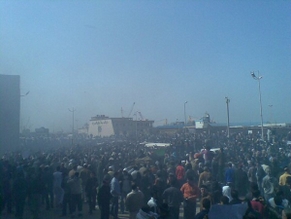|
World Jewish News

Manifestation in Benghazi. Photo by aljazeera.net
|
EU preparing for possible evacuation of citizens from Libya
21.02.2011, Israel and the World EU foreign ministers said on Monday they will prepare for the possible evacuation of European citizens from Libya in light of recent protests that have reportedly left 223 dead.
The EU does not have the power to order its member states to evacuate their citizens from a foreign country, but ministers can agree on coordinated action in such cases.
"We are very worried about the situation in Libya," Spain's Foreign Minister Trinidad Jimenez said. "At the same time we are coordinating the possible evacuation of EU citizens from Libya, especially from Benghazi."
According to the draft of a joint statement obtained by Reuters, the EU foreign ministers will condemn the repression of anti-government protests in Libya at their meeting later on Monday.
"The Council condemns the ongoing repression against peaceful demonstrators in Libya and deplores the violence and the death of civilians," the draft statement said.
The statement further stated that "freedom of expression and the right to assemble peacefully are fundamental rights of every human being which must be respected and protected."
EU foreign ministers are meeting in Brussels Monday to discuss the uprisings across North Africa and the Gulf and are expected to focus on Egypt and on Libya where there have been days of protests against President Muammar Gadhafi's 40-year rule.
Libya has told the European Union that it will stop cooperating on illegal migration if the EU continues to encourage pro-democracy protests in the country, the bloc's Hungarian presidency said on Sunday.
This is not the first time Libya has threatened to cancel cooperation with the EU on illegal migration. In December, a minister said Libya would scale back efforts to stem the flow of migrants unless the EU paid it 5 billion euros ($6.8 billion) a year.
Tens of thousands of illegal migrants try to make the journey from the northern coasts of Tunisia and Libya to islands off Italy every year, and hundreds have to be rescued by Italy's coastguard and housed in migration centers.
The European Commission said in October it would spend 50 million euros to help Libya tackle illegal migration and protect migrants' rights.
EU foreign policy chief Catherine Ashton said during a visit to the region last week that Libya should listen to what protesters were saying and "allow free expression."
Italian Foreign Minister Franco Frattini said Italy, which has widespread business interests in Libya, particularly in the energy sector, was concerned about developments. The foreign minister fears for a possible civil war that would lead to the break-up of Libya and the creation of an Islamic state in the western part of the country.
Frattini has called for a Marshall Plan for affected Mediterranean countries to stimulate their economies and provide job opportunities for young people.
"We need a European comprehensive action plan," Frattini said, "we should support all peaceful transitional processes that are ongoing in the Middle East while avoiding a patronizing position."
Haaretz.com
|
|
